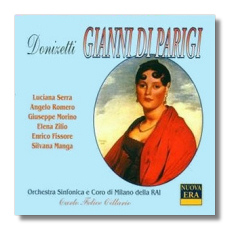
The Internet's Premier Classical Music Source
Related Links
- Donizetti Reviews
- Latest Reviews
- More Reviews
-
By Composer
-
Collections
DVD & Blu-ray
Books
Concert Reviews
Articles/Interviews
Software
Audio
Search Amazon
Recommended Links
Site News
 CD Review
CD Review
Gaetano Donizetti

Gianni di Parigi
- La Principessa di Navarra - Luciana Serra, soprano
- Il Gran Siniscalco - Angelo Romero, baritone
- Gianni di Parigi - Giuseppe Morino, tenor
- Oliviero - Elena Zilio, mezzo-soprano
- Pedrigo - Enrico Fissore, baritone
- Lorezza - Silvana Manga, soprano
Milan RAI Symphony Chorus
Milan RAI Symphony Orchestra/Carlo Felice Cillario
Nuova Era 6752/53 2CDs Recorded September, 1988
This early Donizetti opera had a peculiar history. It was apparently written in 1828 for Naples (witness the tarantella in Act II), but for unknown reasons was not staged there. In 1830 the composer gave it to the famous tenor Giovanni Rubini, expecting he would take it to Paris and make the composer's reputation there, but again for unknown reasons, this did not happen, and the opera seems to have been lost until it was finally presented without attribution to Donizetti at La Scala in Milan in 1839. It then vanished from the repertory, and that's surprising, because while it is an immature work in which he had not yet found his own voice – the influence of Rossini is very clear – it represents him at his youthful and ebullient best and clearly presages the mature brilliance that we hear in such masterpieces as Don Pasquale.
Felice Romani's libretto is based on a text by d'Aucourt de Saint-Just for Boieldieu's 1812 comic opera Jean de Paris; it had already been set to music in 1818 by Francesco Morlacchi, and was considerably revised by Donizetti. The simple story derives from a 15th-century romance, vaguely historical in nature, about the heir to the throne of France (Gianni), who is betrothed to the Princess of Navarre but wants to see her for himself before their marriage. To do so, he poses as a wealthy burgher and takes over an inn that she has reserved as a stop en route to Paris; he invites her to dinner, she recognizes him but goes along with the game, and they fall in love and into each other's arms. Comic relief is provided by the Princess's pompous and snobbish Grand Steward and the harassed inn-keeper (Pedrigo). The score is full of good tunes, coloratura pyrotechnics (specially for the Princess), lyrical effusions, and effervescent concerted numbers.
This is another of the many recent recordings of provincial performances of obscure Italian operas, in this case a 1988 production in Bergamo, Donizetti's home town, and it is considerably better than average. The cast is more than adequate; their voices are well-trained, their characterizations are broad but effective, they have a good understanding of bel canto style, and they manage the display pieces quite well. Serra and Martin are suitably clear-voiced and ardent as the lovers, despite his occasional wobble and her occasional shrillness, Romero and Fissore make the most of their rapid exchanges and comic turns, and Zilio sings beautifully in the Act II ballad ("Mira, o bella"). The orchestra and chorus are somewhat scrappy, but Cillario drives them along briskly. The sound is somewhat metallic and bass-shy but adequate. The result is a thoroughly enjoyable release.
Copyright © 1999, Alexander J. Morin


















